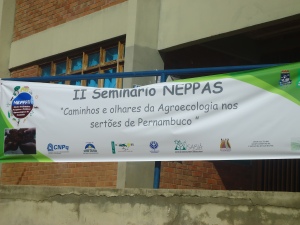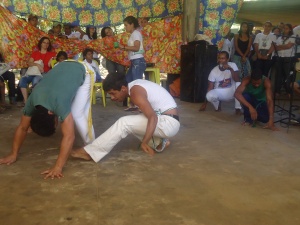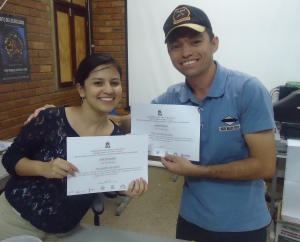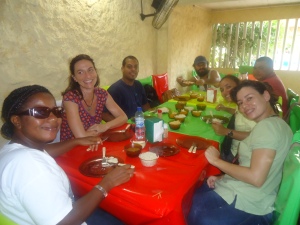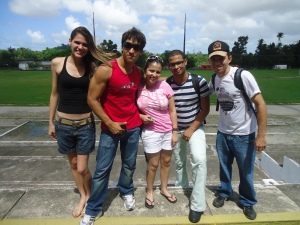Archive
Yesterday’s Dialogue with Masters Students of International Development/Ag. Education
My really great friend Karyssa (shout out to her for all her accomplishments, the most recent being becoming a Peace Corps volunteer in Paraguay- whoop!) invited me to be part of her class, titled The Agricultural Advisor in Developing Nations. All students, as she explained it to me, were assigned to interview somebody who had had an experience in international development and encountered a problem, which then would have to be discussed by the students and together they would come up with a solution. She, very kindly I must add, asked me to be her interviewee. Of course I was honored and ready to jump into it. Her presentation about my work and findings on Agroecology and dialogical communication as an alternative comprehensive social and environmental model to the predominant conventional agricultural model (big agriculture) and extension model employed throughout the developing world caught the class’ attention and resulted in a very fruitful and meaningful dialogue. I was oh so so happy! 🙂
While I have had the extraordinary luck to introduce my colleagues’and my work through research papers and publications, through intimate conversations with family and friends, and to an extent through multiple presentations including one to a very big audience as the featured speaker for the U.N.’s millenium development goal #7 (ensuring environmental sustainability) in a high-school led Global Summit, this most recent experience with the Masters students helped me achieve a fundamental goal of the Fulrbight program: it began tangible and real dialogue. After all, students in this class are the ones studying the theories and the latest research to become, as Dr. Piña (the class’ professor and another great person I can call a mentor and colleague) put it, the “change agents”. In order to become effective change agents in our evermore fragile world exposed to rapid climate change and pervading poverty and social inequalities, one must be well-rounded and attentive to our global partners’initiatives and successes. Change agents must learn from these and build on these.
Agroecology, as an ecological and scientific response and social movement to the lamentable conditions and realities “en el campo” (of the rural farms), for the first time this past September was given room at one of the highest level U.N. organizations in charge of ameliorating hunger and malnutrition, the Food and Agriculture Organization (FAO). The symposium held in FAO’s headquarters in Rome was titled the International Symposium on Agroecology for Food and Nutritional Security. The Symposium opened a window for Agroecology to enter “in what for 50 years has been the Cathedral of the Green Revolution”, as the FAO Director José Graziano da Silva (another personal hero) put it. Sharing the experiences I had in Brazil about what Agroecology looks like- rural farms in very remote areas with over 30 crops in a small acreage farm ensuring the food security and sovereignty of an entire rural family- was a true privilege. I owe this privilege to my friend Karyssa for making this conversation happen and to the inspirational students who like myself are very young, realistic and ready to analytically and profoundly discuss the problem. I just hope that I (and our lovely fruitful conversation) didn’t rain on the class’ parade, as the class’book is the same one I was given when I went to Brazil (The Diffussion of Innovations by Everett Rogers) whose theories and practices I actually did come back writing about but as to why there is a pressing need for a more horizontal and less hierarchical rural extension model (dialogism or dialogical communication model), based on the social realities at the small-holder farm level. Eeek…! Haha, just kidding…I really don’t think this conversation was bad for the class. If Dr. Piña didn’t want these type of conversations which challenge everything we’ve come to know, then he wouldn’t encourage dialogue and sharing of experiences. But then again, I am very lucky to have some leverage with him due to our past mutual international development work together… *wink*wink*.
Thank you once again, Fulbright. You really deserve the Prince of Asturias award granted only days ago!
2 days before returning to Texas ( I’m sorry I was so absent)
Before setting out in this journey my mom gave me a card that said to pack lightly and that all I needed was in me. Well, unfortunately, I didn’t pack lightly. And, while not everything I needed was in me, except for a me full of dreams, it was enough to get me by.
Here, I came to gain what wasn’t in me, and those things I would have not gained if it wasn’t for coming. Yes, I’m going back with more dreams than I came with, and that’s the most beautiful thing. I just put on my favorite C.D. I bought one day at a bakery corner, of Arlindo Cruz, it’s a mixture of romantic samba and something else. Well, I’m listening to it as I pack, as I look through old papers, books, and good bye messages from only the greatest brasileiros alive; my professor and my life-long (of this I’m certain) friends. And guess what, tears are falling down my face. All I can see when this music plays is me, as the third person, dancing samba, smiling at every wonder I saw from North to South, walking under the heat, waiting for the bus, sitting on the bus (sometimes even hanging squeezed on the Recife buses….for hours), listening to Daniel speak (my best friend here), taking and getting used to cold showers two to three times a day, being taken care of by Fatima, going to see multiple doctors and enjoying (synonymous of exploiting) the health care here, walking to the ATM machines and hiding my money in my secret waist bag, going to the beach with my waist money bag and the gringo king of boa viagem (C.J.) picking at it, drinking only the most refreshing beer on hot days, and dancing with my Sao Paulo girls (Gabi e Mariélen) and can’t forget Disly and Carla, my girls in Bahía and then Rio- now those were some good times! Etc. Etc. Etc. …..etc. etc. etc.
Last week while in Colombia, in an apologetic tone, I told my husband I felt guilty for not saving money and consequently going back to him, broke. He responded, you traveled everywhere, you ate everything, you saw it all, how would you have saved money and why would you have preferred to save money? That’s him, he is the guy I married, the man who waited patiently day and night, in some of his roughest days, in some of mine, who encouraged me to go explore, who found me the most hip places to stay, with whom a call away I just couldn’t be lost in the middle of the Amazon (and no, I didn’t go to the Amazon….ahhhh que raiva!!!).
Now where do I go? I don’t know! I go to be by his side, and that’s the best reward for this accomplished mission, my life’s most ACCOMPLISHED mission, indeed. And I go, as I already said, with a bag full of even more dreams than what I started out with and NOT packed lightly (again), but please give me a break I gotta bring all the souvenirs from everywhere I went for all those who I love and need in my life back home or back in Guate, and now also to my newest family in Colombia. These dreams include two big publications with two of the most maravilhosos brasileiros working onto my newest agroecology dream, and opening an NGO in Salgueiro, no coração do nosso sertão com Daniel….
I finished. Yes, I’m a Fulbright Alumn! God bless Brazil, because “if God ever existed on this earth, it sure was here”-amigo taxista brasileiro in Rio de Janeiro.
I’m feeling grateful for and inspired by
1. Beauty. It’s everywhere, I see it in all places in my daily Recifean life (as the mural I ran into -below-) and mainly in people. I see it through the conversations I engage in and in the actions people take, like the international protest this past Saturday (for an end of women’s violence (VADIA) and the university’s professors’ strike for better working conditions.
2. The upcoming projects, like my trip to the “sertão”- the interior of Pernambuco once again. This time I will go for field days to learn, watch, and take in the realities of small production farmers and their adversities with the drought that they face every year.
3. The possibility of being part of a social movement and address SO IMPORTANT issues like the UTMOST IMPORTANT NEEDED respect of our environment and social justice for vulnerable groups like small farmers, during the event Rio+20.
4.My upcoming personal plans of traveling in this country for “cultural immersion” purposes (which by the way yes it is personal joy traveling, but is also an IMPORTANT component of my scholarship!). I fall in love with Brazil every time I encounter and meet a new dimension of what it has to offer; it’s such a rich country.
“Cuando las fronteras se incrustan en el cuerpo de las mujeres migrantes” Marcela Gereda y Argán Aragón
Artículo: http://www.elperiodico.com.gt/es/20120506/pais/211765/
Encontre este artículo muy interesante, justo y objetivo. En mis estudios sobre el agronegocio versus la agricultura familiar, este artículo relata justamente el panorama, en mi perspectiva.
En especial considero estas citaciones claves:
“Cada año, miles de mujeres y niñas guatemaltecas [y miles mas latinas] cruzan la frontera Guatemala-México con la extendida aspiración de llegar a los Estados Unidos. Nada parece detenerlas, ni los riesgos que han de enfrentar, ni su condición de género, ni el corte indígena, ni el cansancio o el hambre, ni los sistemáticos ataques de pandillas y demás potenciales agresores, ni los innumerables abusos bestiales de la migra mexicana y otras autoridades. Nada de este complejo, agobiante, depredador y asesino camino parece detenerlas.
Y, sin embargo, a pesar del nivel tan masivo en las comunidades rurales de la incesante salida de mujeres hacia el Norte, se tiende a tratarlo como algo personal y familiar y no como algo estructural y político que nos exige ciertas transformaciones como sociedad y como Estado.
…La principal forma de inserción de Centroamérica [y Latinoamérica] en las estructuras globales se produce de forma subordinada a través de los migrantes en la economía estadounidense donde el capital necesita de una mano de obra barata, maleable, deportable, desechable.
…Aquí y allá la gente va inventando estrategias para las crisis, para llenar la panza, para recomponer sus casas, su hambre, sus cosechas; es decir, sus vidas.
…Centroamérica y México entregan sus materias primas a los Estados Unidos y dejan irse los brazos, piernas, energías, juventudes y tiempos para ser el pilar del sector agrícola, constructor, industrial y de servicios de la economía norteamericana.
…Hay entre los seres humanos en general, y entre las mujeres en particular, una tendencia marcada al deseo de una vida mejor. A la búsqueda de un espacio de esperanza. Un sitio donde poderse “superar” no importa el costo, el camino, y todos los depredadores que habrán de enfrentar.
…informes en México apuntan que ocho de cada diez mujeres centroamericanas son violadas en su paso por el territorio mexicano. Está ampliamente documentado que la mayoría de las mujeres debe pagar con su cuerpo para alcanzar la frontera deseada.
….Estas violaciones representan los agujeros negros de nuestras sociedades. Esas injusticias y denigraciones desde las que emergen nuestros Estados. Estas nuevas coordenadas, cartografías y lógicas en la vida de las mujeres implican nuevas formas de relacionamiento, exigen nuevas políticas, cuidados y controles para una población altamente vulnerabilizada.
No solo es que esté cambiando la identidad, la cultura y el paisaje rural a partir de las migraciones o que los jóvenes ya no quieran trabajar la tierra o escuchar a los abuelos, es que también cambian los cuerpos y lo que hay debajo de ellos. Más allá de las nuevas tecnologías, de los nuevos códigos y referentes sociales de interacción y comportamiento, hay pieles femeninas violadas y denigradas.
…la aldea calurosa y cañera, donde mientras los millonarios emporios del azúcar generan estrafalarias ganancias, la única salida para millones de mujeres es cruzar la frontera para dar a sus hijos lo que cortar caña definitivamente no les puede dar.
From seminar: “Caminhos e olhares da Agroecologia nos sertões de Pernambuco”
First time participating in the seminar of NEPPAS= Núcleo do Estudos, Pesquisas e Práticas Agroecológicas do Semiárido. Serra Talhada, Pernambuco. April 26-28, 2012.
NEPPAS, da Unidade Acadêmica da Universidade Federal Rural de Pernambuco, tem como objetivos fortalecer a agricultura familiar e camponesa atráves do apoio a transição agroecológica por meio de ações de extensão, pesquisa e ensino, além de sistematizar o processo de experimentação, divulgando as metodologias, práticas e tecnologias adaptadas que contriubam para a sustentabilidade do semiárido no sertão pernambucano.
ENGLISH: NEPPAS= Studies, Research and Agroecological Practices of Pernambuco’s Semiarid
NEPPAS, the Academic Unit of the Universidade Federal Rural de Pernambuco in Serra Talhada, Pernambuco,aims to strengthen family and peasant agriculture through the support of agroecological transitions with extension, research and teaching, besides systematizing the process of experimentation, by disclosing the methodologies, practices and technologies adapted that will contribute to sustainability in the semi-arid backlands of Pernambuco.
ESPAÑOL: NEPPAS= Estudios, Investigación y Prácticas Agroecológicas para el Semiárido de Pernambuco
Abril 26-28,2012
NEPPAS, de la Unidad Académica de la Universidad Federal Rural de Pernambuco, tiene como objetivo fortalecer la agricultura familiar y campesina a través del apoyo de la transición agroecológica por medio de la extensión, investigación y enseño, además de sistematizar el proceso de experimentación, divulgando las metodologías, prácticas y tecnologías adaptadas que contibuyen para la sustentabilidad en las tierras del interior semiárido de Pernambuco.

“A sustentabilidade e a autogestão são construídas através da apropriação de novas tecnologias a exemplo dos fogões agroecológicos.”



Nas comunidades: Rio Formoso
Pesquisa sobre a criação e produção da CULTURA pelos jovens de Rio Formoso- À 2 hrs. de Recife. Abril 26.2012
Español: Investigación sobre la creación y producción de cultura por los jovenes de Rio Formoso- A 2 horas de Recife. Abril 26.2012
English: Research on the creation and production of Culture by the youth of Rio Formoso- 2 hrs. away from Recife. April 26.2012




Líder de dança de Rio Formoso- “Tschon”: Temas: Políticas Publicas, Valorização da Dança pelos Jovens e pela comunidade, etc.
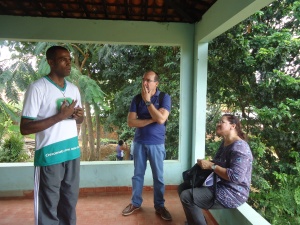
First blog in Brazil about Brazil: The people I’ve met
It’s about time I write about Brasil? Other than my take on the language? Yes! Well, I’m finally “stable”. I already moved three times (nothing new with my usual lifestyle), and I’m settled. Currently, I’m at an apartment complex with foreigners and Brazilians. Most of them either attend one of the two universities, Universidade Federal de Pernambuco or Rural de Pernambuco, or they teach. I attend both; Rural for the two Master’s classes and Federal for “Português Avançado”… haha, yes! I enrolled in that class, mainly because I’ve learned the basics via Rosetta Stone—Thanks Borlaug Institute- and now I just need to become decent in writing since writing about dense subjects is what we do in the Master’s Program I’m part of, Extensão Rural & Desenvolvimento Local.
So, is it a myth or reality? ARE BRAZILIANS THE NICEST PEOPLE ON EARTH? THE HAPPIEST? Below I will write what I know of them (p.s. A total reality!)
Day 1 I get to Recife (the São Paulo experience was so short, I didn’t get to experience the Brazilians, other than Luana and Patricia from the Fulbright Commission, who since we established communication they were already extraordinary): the few friends I had here picked me up at the airport, took me out to eat seafood at the beach and made me feel as welcomed as my family would.
My amazing friend who I’ve talked about in the past here on my blog, Dennis Cunha, and his family took me in right away after my first living situation wasn’t ideal, NO QUESTIONS ASKED (do we know the importance of this phrase?). His mother, Fatima, offered me her house and her time. She offered me a new Brazilian HOME (and all that word means, starting with acceptance and so much care). I have to say I never thought in a million years I would fall right into place in anyone’s home and in anyone’s heart as I did with Dennis’ mom; she calls me “minha filha gringa” (and yes, she also knows I’m Guatemalan). She has taken me to the doctor and we’ve spent days together even now that I’m at my new apartment, which by the way she and Dennis helped me move into (Fatima even made my bed the first day I slept here). I feel happy, safe, and cared for.

My friends at school are so smart, they care so much about the rural communities and the people who make up these realities. They, like me, know how important justice and equality is for these individuals- just another group of society who are left vulnerable after the adoption of decisions and policies of the elites and governmen. My friends know so much more about these realities, specifically in the Brazilian context; every two days a week I take classes with them and hear their well-constructed and well-informed opinions, their proposed solutions to problems, and all topics related to agricultura familiar, pequenos agricultores, terras, etc. All the reasons why I’m here.
I have not only met this group of people with conviction and dedication. I also met a group of mostly women of a sindicato yesterday. My friend Caitlin, a soccer player and my fellow Fulbrighter, brought me to a meeting where women from different social groups and movements discussed equality, justice, and a variety of topics that dictate the actions they will take for the benefit of the working woman in Recife, Pernambuco, Brazil. This reminds me of my young days in which I was an active member of a similar group in Guatemala, less by choice as I was only a child and my grandmother was the forefront feminist coordinator of GRUFE, a feminist NGO that offered help and resources to women from all paths of life.
Other than these specific groups, I’ve met people here at my apartment and other friends from my Portuguese class. For example my Peruvian friend Jose. He is here trying to get into a Master’s program and research a topic related to ecology and sustainable growth. I feel so connected to the foreigners because we are here with the same purpose, to live within the Brazilian natives and experience the Brazilian culture. We believe this is a place of opportunity and personal growth with enriching experiences and people.
Which, brings me to my last point, Brazilian natives. I’ve met many already and day by day I’m experiencing their realities, and this fills me with satisfaction (all realities included, including not taking “security” for granted the way we greatly enjoy this in the U.S.). Their common denominators: HARD-WORKING, KIND, CARING, CALMED, LIFE-LOVING and most of them with the same purpose in life: A Better Life, A Better Tomorrow. All people I’ve met always always always have a place to show me, a place I can stay in, an extra garrafo of oil, time to meet again, time to talk again, time to make a deeper connection. They are great!
Mi idioma natal
Del grupo Fulbright que venimos a Brasil, soy la única intercambista que no maneja el portugués con facilidad. También soy la única que fue privilegiada en tener el español como primera lengua, lo que significa que no tuve que pasar años aprendiendo el portugués para poder conversar un poco, leer y escribir. No lo niego me está retando y a la vez pienso (en especial cuando me encuentro con lecturas mas fáciles que otras de las clases de maestría que estoy tomando en la Universidad Federal Rural de Pernambuco en el programa de Extensão Rural e Desenvolvimento Local): “wohoo, que buenísimo poder tachar otro reto desafiado más fuera de la lista de retos que tengo!”
En mi última hoja de vida, o Curriculum Vitae, me ha dado vergüenza escribir que me gradué con un Minor en Español (aparte del Major en Ciencias Políticas y Minor en Filosofía). Siento como si hubiera “cheated” (mentido) cuando digo que estudie el español, pues ya lo sabía (o por lo menos lo hablaba, escribía, y leía- aunque no tanto como me gustaría). Pero en realidad los idiomas no son algo que se sabe manejar a la perfección solo porque es el primer idioma o porque es el idioma de la familia. Mejor dicho, un idioma se “conoce” y se maneja cuando uno le dedica el esfuerzo a hablarlo bien, escribirlo bien, y sobre todo cuando se sabe comunicar en él.
Me siento privilegiada en haber tenido una familia académica que me inculcó el respeto a los libros, la comunicación por escrito, en especial mi abuelita que dada a nuestra separación cuando tan solo tenía yo diez años y me mude a otro país, tal comunicación se estableció y continuó así inculcando en mi la libre expresión de ideas en mi idioma natal.
Que bueno que estudie más sobre el idioma español, sus reglas, y sobre la literatura latinoamericana en la Universidad. Ya no me dará vergüenza nunca más mencionarlo en mi hoja de vida, así como por supuesto tampoco el portugués ;)….
“Brazilian Portuguese is the best language” by Helen Joyce
“Brazilian Portugues in the best language”
This is a link to a great article shared by a new Brazilian friend of mine, obrigada Rafael!
If you want a decent return on your investment, says Helen Joyce, the best language to learn is Brazilian Portuguese…
Some lunatics learn languages for fun. The rest of us are looking for a decent return on our investment. That means choosing a language with plenty of native speakers. One spoken by people worth talking to, in a place worth visiting. One with close relatives, so you have a head start with your third language. One not so distant from English that you give up.
There really is only one rational choice: Brazilian Portuguese. Brazil is big (190m residents; half a continent). Its economic prospects are bright. São Paulo is Latin America’s business capital. No other country has flora and fauna more varied and beautiful. It is home to the world’s largest standing forest, the Amazon. The weather is great and so are the beaches. The people are friendly, and shameless white liars. You’ll be told “Your Portuguese is wonderful!” many times before it is true.
You won’t need a new alphabet or much new grammar, though you may find the language addicted to declensions and unduly fond of the subjunctive. You’ll learn hundreds of words without effort (azul means blue, verde means green) and be able to guess entire sentences (O sistema bancário é muito forte: the banking system is very strong). With new pronunciation and a few new words you’ll get around in Portugal and parts of Africa. If you speak Spanish, French or Italian, you’ll find half the work is already done — and if not, why not try? With Portuguese under your belt you’ll fly along.
Best of all, you’ll stand out. Only about 10m Brazilians have reasonable English, and far more Anglophones speak French or Spanish than Portuguese, of any flavour. I did not choose this language; it was thrust on me by the offer of a job in São Paulo. But when I think of my sons, now ten and five, one day being able to write “fluent Brazilian Portuguese” on their CVs, I feel a little smug.
Where I come from
Yesterday I had a long phone conversation with my boyfriend. We discussed the difference in cultures, and he not only made me appreciate mine more than ever, but he also made me re-examine what the Guatemalan culture offers. I can only think of 1 big word that encapsulates it all. That is HUMILITY. What exactly humility means is really a matter of perception, as he said it. But to me humility is very simple; it means being humble, and it means caring. It just seems as if most people put themselves first and above beyond everyone in cultures like the American culture. While I agree we should do that to a great extent because we need to be okay to offer more and give more to others, we still should act with humility first and foremost, that is showing in a meaningful way every time we can how thankful we are, how much we appreciate friendship, food, family, and whatever we think is important. Always keeping in mind we can harm others when we don’t act with humility towards them.
Angela, my young aunt, sent this to me and I want to say, I love Guate deeply.
Cheers and enjoy!





